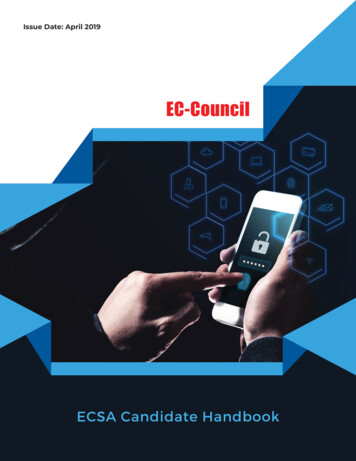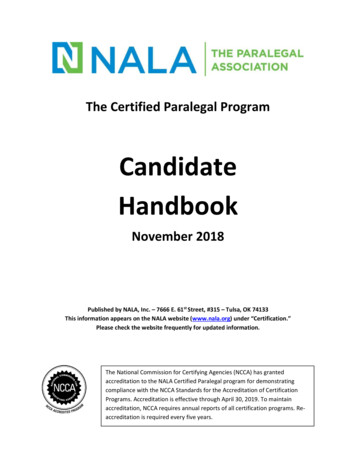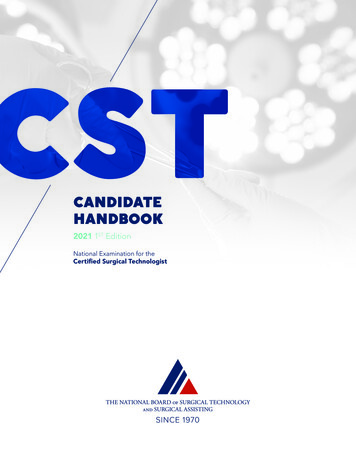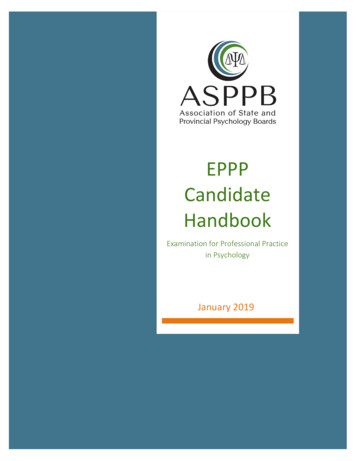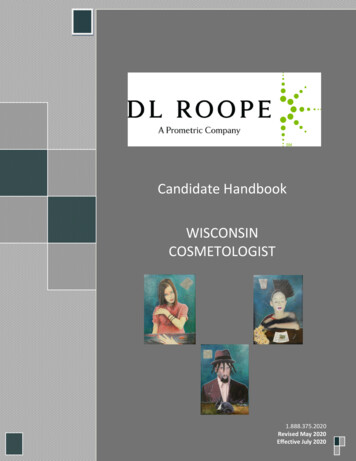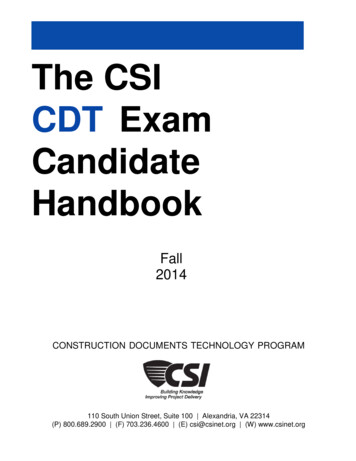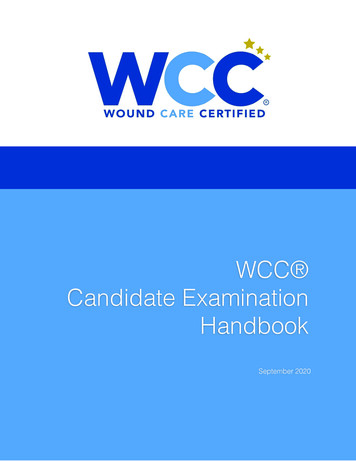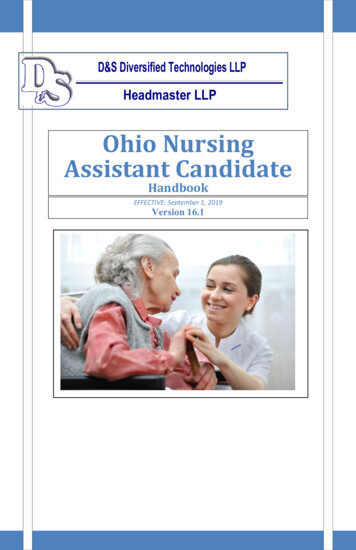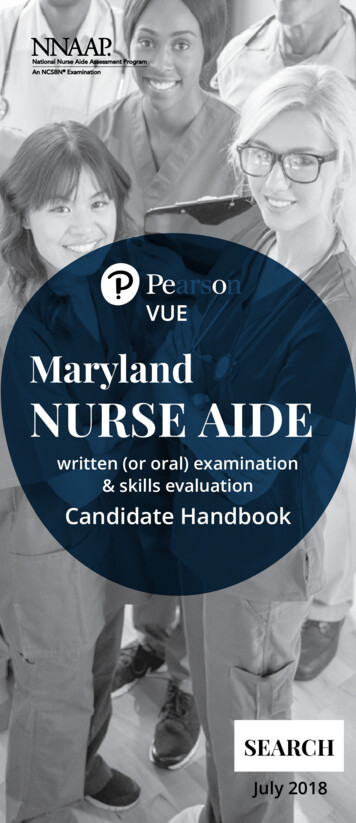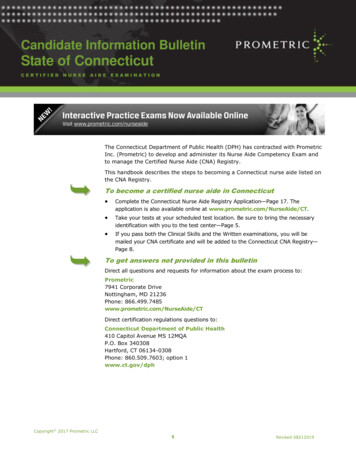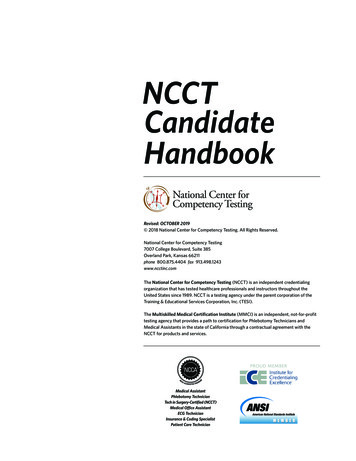
Transcription
NCCTCandidateHandbookRevised: OCTOBER 2019 2018 National Center for Competency Testing. All Rights Reserved.National Center for Competency Testing7007 College Boulevard, Suite 385Overland Park, Kansas 66211phone 800.875.4404 fax 913.498.1243www.ncctinc.comThe National Center for Competency Testing (NCCT) is an independent credentialingorganization that has tested healthcare professionals and instructors throughout theUnited States since 1989. NCCT is a testing agency under the parent corporation of theTraining & Educational Services Corporation, Inc. (TESI).The Multiskilled Medical Certification Institute (MMCI) is an independent, not-for-profittesting agency that provides a path to certification for Phlebotomy Technicians andMedical Assistants in the state of California through a contractual agreement with theNCCT for products and services.
www.ncctinc.comContentsMISSION STATEMENT . 5ABOUT THE NCCT . 5BOARD OF TESTING . 5CERTIFICATION SCOPE . 6BENEFITS OF CERTIFICATION . 7NONDISCRIMINATION STATEMENT . 8ELIGIBILITY CRITERIA . 8CREDENTIAL-SPECIFIC ELIGIBILITY CRITERIA . 10ELIGIBILITY RATIONALE . 12ELIGIBILITY APPEALS . 13APPLICATION REQUIREMENTS . 13SUPPORTING DOCUMENTATION . 14DOCUMENTATION VERIFICATION . 14EXAMINATION FEES . 15INCOMPLETE APPLICATIONS . 15EXAM SCHEDULING . 15CANCELLATIONS, RESCHEDULING, AND REFUNDS . 16EXAM DEVELOPMENT . 16STUDYING FOR THE EXAMINATION . 17DETAILED TEST PLANS . 17EXAM SPECIFICATIONS . 17EXAM TAKING STRATEGIES . 18LANGUAGE . 18TESTING SITES . 18WHAT TO EXPECT ON EXAM DAY . 18SPECIAL ACCOMMODATIONS . 20CHEATING . 20COPYRIGHT INFORMATION . 20EXAM RESULTS . 21UNDERSTANDING YOUR SCORE . 21RE-EXAMINATION . 21EXAM RELATED COMPLAINTS . 22HAND SCORING . 22Page 3
Page 4IRREGULARITIES . 22INTRODUCTION . 23COMPLAINTS . 23COMPLAINT REVIEW . 24DETERMINATION OF VIOLATION . 25SANCTIONS . 26APPEAL . 26RESIGNATION . 27RECERTIFICATIONPURPOSE . 27RECERTIFICATION REQUIREMENTS . 27CONTINUING EDUCATION REQUIREMENTS . 28ACTIVE EXPIRATION DATE . 28RECERTIFICATION PERIOD . 28RECERTIFICATION RATIONALE . 28CODE OF ETHICSINTRODUCTION . 29PURPOSE . 29CODE OF ETHICS . 29NCCT POLICIESCONFIDENTIALITY . 30RELEASE OF INFORMATION . 30VERIFICATION . 30AGGREGATE DATA . . 31USE OF CERTIFICATION MARK . 31FOREIGN TRANSCRIPT EVALUATION SERVICE ORGANIZATIONS . 32SAMPLE QUESTIONS . 33SPECIAL ACCOMMODATIONS REQUEST FORM . 36DOCUMENTATION OF DISABILITIES-RELATED NEEDS FORM . 37www.ncctinc.com
www.ncctinc.comPage 5Mission StatementIt is our mission to certify healthcare professionals and provide pathways to lifelong learning in related healthcare disciplines.About NCCTEstablished in 1989, the National Center for Competency Testing (NCCT) is an independent credentialing organization thathas tested more than 500,000 healthcare professionals and instructors throughout the United States. NCCT provides multiplequalifying paths for certification in the following roles: ECG TechnicianInsurance and Coding SpecialistMedical AssistantMedical Office AssistantPatient Care TechnicianPhlebotomy TechnicianPostsecondary InstructorSurgical TechnologistNCCT certification is recognized by national certifying agencies and by leading healthcare providers and postsecondary institutions.The ECG Technician (NCET), Medical Office Assistant (NCMOA), National Certified Medical Assistant (NCMA), NationallyCertified Phlebotomy Technician (NCPT), National Certified Insurance and Coding Specialist (NCICS), National CertifiedPatient Care Technician (NCPCT) and Tech in Surgery - Certified TS-C (NCCT) certification programs have earnedaccreditation from the National Commission for Certifying Agencies (NCCA), the accrediting arm of the Institute forCredentialing Excellence (ICE).Both the Commission on Accreditation of Allied Health Education Programs (CAAHEP) and the Accrediting Bureau of HealthEducation Schools (ABHES) approves the NCMA certification examination for use as a program outcome measure.Board of TestingThe NCCT Board of Testing (BOT) was established in 2008 to promote the highest standards for allied health professionalsand instructors through the development, implementation, coordination, and evaluation of all aspects of the certification andcertification renewal processes and to enhance public protection. The BOT is an independent and autonomous governing bodyfor the NCCT’s certification programs.The purpose of the Board of Testing includes maintaining the integrity of NCCT testing as related to eligibility, examinationdevelopment and administration, examination scoring and all other certification decisions. Certification programs offered bythe BOT are developed and administered in compliance with nationally accepted accreditation standards for certificationprograms. The BOT is solely responsible for essential decisions related to the development, administration, and ongoingmaintenance of the certification programs.
Page 6www.ncctinc.comCertification ScopeThe Board of Testing has established multiple qualifying pathways for healthcare-specific certifications in recognition of thediversity in education and experience of qualified applicants. The certification programs are developed for healthcareprofessionals and instructors throughout the United States.CERTIFICATION AS AN ECG TECHNICIAN (NCET)Demonstrates healthcare-specific competency and a commitment to consumer safety by entry-level allied healthprofessionals who perform diagnostics and assessments of the heart rhythm and rate of patients. Professionals who earn theNCET designation have the clinical skills and knowledge for proper electrode placement, electrocardiogram (ECG) recording,preparing reports for physicians, ensuring patient comfort and safety, and troubleshooting ECG recording abnormalities. TheNCET is typically employed in medical-practice settings such as inpatient hospitals, physician offices, and outpatient clinics.CERTIFICATION AS AN INSURANCE & CODING SPECIALIST (NCICS)Demonstrates healthcare-specific competency and a commitment to consumer safety by entry-level allied healthprofessionals who provide medical billing and coding services for services rendered by health care providers. Professionalswho earn the NCICS designation have the skills and knowledge in medical terminology, anatomy & physiology, diagnostic andprocedural coding, insurance claims processing, and medical billing procedures for preparing, submitting, and sending claimsand statements to insurance companies and patients. The NCICS is typically employed in medical-practice settings such asphysician offices and medical specialty practices.CERTIFICATION AS A MEDICAL ASSISTANT (NCMA)Demonstrates healthcare-specific competency and a commitment to consumer safety by entry-level allied healthprofessionals who perform administrative and clinical duties typically under the supervision of licensed medical personnel.Professionals who earn the NCMA designation have the clinical skills and knowledge for safe performance of clinicalprocedures related to pharmacology (including injections), vital signs and other patient examination tasks, venipuncture andmicrosampling, point of care and other diagnostic testing, electrocardiography, and administrative procedures related tomedical office management. The NCMA is typically employed in medical-practice settings such as physician offices andoutpatient clinics.CERTIFICATION AS A MEDICAL OFFICE ASSISTANT (NCMOA)Demonstrates healthcare-specific competency and a commitment to consumer safety by entry-level allied healthprofessionals who perform medical office administrative tasks beginning with initial patient contact through final payment.Professionals who earn the NCMOA designation have the knowledge and skills to perform front office functions such asscheduling, communicating with healthcare professionals, patients and third party payers, handling medical records, financialmanagement, and compliance with state and federal regulations. The NCMOA is typically employed in medical-practicesettings such as physician offices, outpatient clinics, and specialty practices.CERTIFICATION AS A PATIENT CARE TECHNICIAN (NCPCT)Demonstrates healthcare-specific competency and a commitment to consumer safety by entry-level allied healthprofessionals who perform direct patient care within their regulated scope of practice. Professionals who earn the NCPCTdesignation have the clinical skills and knowledge for basic nursing assistant tasks (as delegated by the nursing or medicalstaff) which may include obtaining patient vital signs and other data, communicating with the healthcare team and patients,assisting with activities of daily living, complying with confidentiality requirements, and performing electrocardiograms andphlebotomy tasks. The NCPCT is typically employed in medical-practice settings such as home health, long-term care,assisted living, and hospital settings.
www.ncctinc.comPage 7CERTIFICATION AS A PHLEBOTOMY TECHNICIAN (NCPT)Demonstrates healthcare-specific competency and a commitment to consumer safety by entry-level allied healthprofessionals who are qualified to obtain patient specimens. Professionals who earn the NCPT designation have the clinicalskills and knowledge for performing venipuncture, micro-collection, specimen processing and handling, and maintainingpatient safety and confidentiality. The NCPT is typically employed in medical-practice settings such as hospital settings,physician offices, and outpatient clinics.CERTIFICATION AS A TECH IN SURGERY – CERTIFIED TS-C (NCCT)Demonstrates healthcare-specific competency and a commitment to consumer safety by entry-level allied healthprofessionals who perform pre, intra, and post operative tasks. Professionals who earn the NCCT designation have the clinicalskills and knowledge for maintaining asepsis during surgery, anticipating the surgeon’s needs, and remaining attentive to allaspects of the surgical procedure to ensure a safe environment for the patient. The TS-C (NCCT) is typically employed inmedical-practice settings such as inpatient hospitals or outpatient surgical centers.CERTIFICATION AS A CERTIFIED POSTSECONDARY INSTRUCTOR (CPI)Demonstrates post-secondary instructional competency and a commitment to consumer safety by entry-level individuals whoact in a teaching or training capacity without a formal academic background in education. Professionals who earn the NCCTCPI designation are subject matter experts with the knowledge and skills to design, implement and evaluate learningobjectives, instructional plans, and methods of assessment in postsecondary learning settings. The CPI is typically employed incareer or technical colleges or in non-academic institutions with training programs in healthcare, but the credential may beearned by instructors outside the healthcare field.Benefits of CertificationCertification is a standardized process, often voluntary, by which individuals who have demonstrated the level of knowledgeand/or skill required in the profession, occupation, role, skill, or specialty area are recognized and identified to the public andother stakeholders.By voluntarily becoming certified, individuals demonstrate to employers a commitment to their profession. They havechallenged their knowledge against a national examination and against accepted national standards. By maintaining theircertification year after year, they demonstrate that professional growth and development is important to their performanceas professionals.Although certification is voluntary for the majority of professionals who hold it, many employers have come to expect it andmake it a condition for employment. For consumers, certification provides a level of assurance that certificants areprofessionally qualified to do what they claim they can do.NCCT is selected for testing and continuing education needs by facilities and organizations across the United States.Examples include: Hospitals and Medical CentersState/County Public Health ProgramsSchool District Regional Occupational Programs (ROP) FacilitiesOutreach Training CentersMedical LaboratoriesCenters for Employment TrainingCenters for Workforce DevelopmentJob Corps CentersU.S. Armed Forces
Page 8www.ncctinc.comNondiscrimination StatementNCCT and the Board of Testing do not discriminate against any candidate for certification on the basis of race, color, creed,age, gender, national origin, religion, disability, marital status, parental status, ancestry, sexual orientation, military dischargestatus, source of income, or any other status protected by applicable local, state, or federal laws. All candidates forcertification will be judged solely on the published eligibility criteria determined by the BOT.Eligibility CriteriaNCCT has developed requirements for eligibility to ensure that the application process is fair and impartial for all applicants.Each eligibility requirement has been established to ensure that individuals certified by NCCT have an acceptable level ofknowledge and skill needed to demonstrate healthcare-specific competency and a commitment to patient safety in medicalfacilities and practice settings. In establishing these requirements, the NCCT acknowledges that a combination of education,experience, and training have resulted in a sufficient understanding of the knowledge, skills, and abilities essential forindividuals earning NCCT credentials. Using a nationally recognized process to define the roles and responsibilities of theindustry professional, NCCT awards healthcare-specific credentials after the individual passes the certification examination todemonstrate their competence.NCCT has three (3) routes of eligibility for its healthcare examinations (excluding the CPI) which include the following stipulations: All qualifying education and experience must be less than five years old. All routes require the candidate to have graduated from a United States high school or hold equivalent credentials.Passing the U.S. General Educational Development (G.E.D.) test or any of the U.S. Department of Education approvedexaminations will be considered equivalent to the U.S. high school diploma for purposes of qualifying forNCCT certification. NCCT defines full-time experience as a minimum of 40 hours per week; self-employment does not qualifytoward experience. Working as an instructor is not equivalent to working as a practitioner. Certification is not conferred until candidates submit all required documentation and fees, and passthe certification examination.
www.ncctinc.comPage 9ROUTE 1RO U TE 2RO U TE 3ED UCATI ONQ UA L IFICATIO N BYEXP ERIEN C EM IL ITA RYA. CURRENT STUDENTA student in an educational programvalidated by NCCT for eligibility to test in afield of study certified by NCCT. Studentsmust be currently attending the programand verified to be in good standing.After successful challenge of thecertification examination, students mustfulfill the following for certification: Submission of a copy of thecertification discipline diploma,certificate of completion, orofficial (signed) transcript withgraduation date; Completion and submission of thecredential-specific Critical SkillsCompetency form, as applicable; and Submission of all required documentswithin two years after successfulprogram completion for thecertificate to be released.B. GRADUATEA graduate within the past five (5) yearsfrom an educational program validated byNCCT. After successful challenge of thecertification examination, graduates mustfulfill the following for certification: Submission of a copy of thecertification discipline’s diploma,certificate of completion, ortranscript with an official graduationdate; and Completion and submission of thecredential-specific Critical SkillsCompetency form, as applicable. Verifiable experience as apractitioner within thepast five (5) years. Submission of a copy ofthe official high schooldiploma (or equivalent). Submission of theQualification byExperience formcompleted by anemployer. Completion of additionalcredential-specificrequirements, aspublished. Fulfillment ofcredential-specificexperience requirements,as published. Submission of a copy of aJoint Services Transcript(JST), Sailor Marin
certification as a medical assistant (ncma) Demonstrates healthcare-specific competency and a commitment to consumer safety by entry-level allied health
